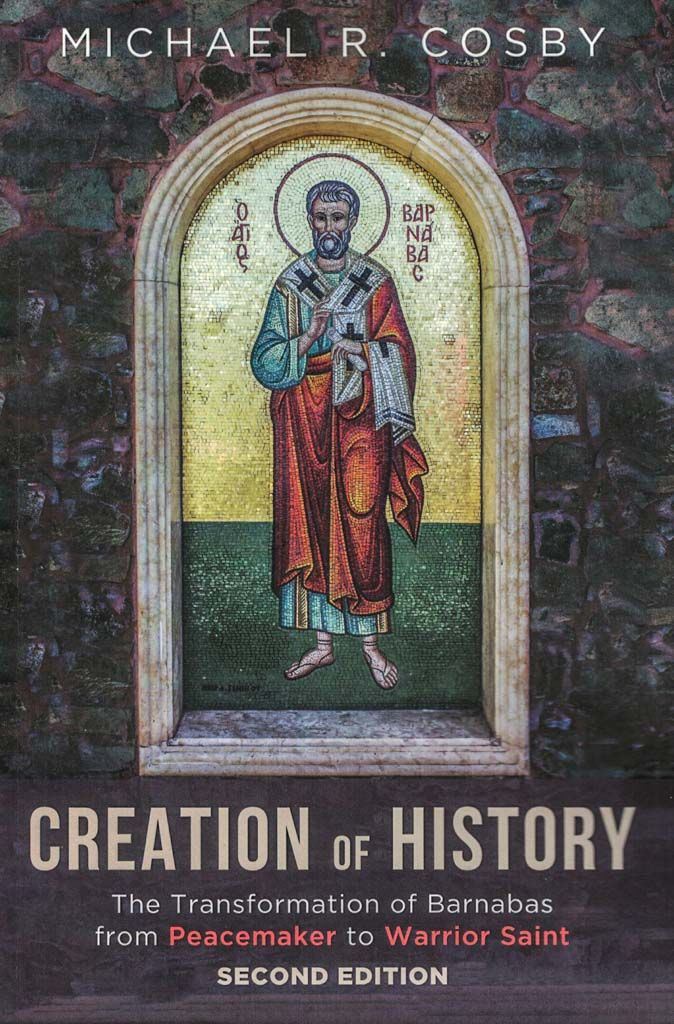Michael R. Cosby
Author, Scholar, Speaker
Creation of History: The Transformation of Barnabas from Peacemaker to Warrior Saint: Second Edition
Eugene, OR: Cascade Books, 2021
In this groundbreaking study, Michael Cosby uncovers the unknown history of the transformation of the apostle Barnabas from a peacemaker to a warrior saint. Modern Cypriot beliefs about Barnabas diverge significantly from the New Testament depiction of the man as a leader involved in creative solutions to ethnic conflicts in the early church. Over the centuries, he morphed into a symbol of Greek Cypriot nationalism, bequeathing his power to the archbishop in Nicosia. This modern, mythical St. Barnabas resulted from a complicated blend of religious and political maneuvering at key points in the history of Cyprus. Orthodox clergy made a consensus builder complicit in the ongoing strife between Greek Cypriots and Turkish Cypriots. Cosby’s thought-provoking book challenges readers to ponder their own beliefs to sort through what is history and what is legend.
Endorsements:
“Professor Cosby’s work masterfully brings to light two versions of Barnabas, the New Testament peacemaker and spiritual mentor of Paul, and the socially constructed Barnabas of Cypriot history. Cosby breaks new ground in biblical scholarship. I am certain that it will serve as a gadfly, opening the way for further scholarly interest and explorations of Barnabas and his neglected New Testament legacy.”
—Kyriacos C. Markides, University of Maine
“Based on his research as Fulbright Scholar in Cyprus (2011), Michael Cosby has written an academic biography of the biblical Barnabas, a surgical dissection of the modern legend of the saint, and a sympathetic and personal account of how and why Cypriots turned their bridge-building apostle into a bridge-burning nationalist.”
—Christopher Schabel, University of Cyprus
“Michael Cosby’s revised Creation of History is a fascinating study on the long afterlife of Barnabas, patron saint of Cyprus and ‘founder’ of the island’s church. Combining personal anecdotes, rigorous scholarly investigation, and sharp historical analysis, Cosby weaves together an absorbing narrative about the memory, fabrication, and reception of the saint’s life, a devotional and political process that has lasted nearly two millennia and still continues among Cypriots today.”
—Young Richard Kim, University of Illinois Chicago
“Lays out the story of St. Barnabas, and his transformation from the New Testament ‘Son of Encouragement’ to the twenty-first-century warrior-saint. In telling this fascinating tale of the fluidity of identity, Cosby never loses sight of the intimate relationship Greek Cypriots have with their saints and their own torturous past. This is a must-read for understanding Cyprus and Orthodoxy.”
—Thomas W. Davis, Lanier Center for Archaeology, Lipscomb University
“Cosby’s Creation of History is a fascinating account of the manner in which a simple New Testament portrayal of an early leader, Barnabas, can be transformed by local religious and political leaders . . . into a totally different picture of the saint. Cosby’s meticulous scholarship and intensive research in Cyprus provide the reader with an intriguing view of this evolution and challenge the reader to question if this could also be occurring in our own country.”
—Mary Ann Stachow, Xavier University of Louisiana
Praise for the first edition:
“New Testament scholar Michael Cosby has written a uniquely wonderful book, a combination of an academic biography of the biblical Barnabas, a surgical dissection of the modern legend of the saint, and a sympathetic and personal account of how and why Cypriots have turned their bridge-building apostle into a bridge-burning nationalist. In destroying the myth of the warrior Barnabas, Professor Cosby seeks to restore to all Cypriots something greater: the Barnabas of peace and understanding.”
—Christopher Schabel, University of Cyprus
“Topics touching on religiously based national beliefs require great care in both research and presentation. Cosby has done his due diligence in searching out the New Testament roots and later historical elaborations of the life and ministry of the early Christian known as Joseph Barnabas. His meticulous examination of data regarding this saint is presented in a very readable fashion, but he also demonstrates great sensitivity to the religious sentiments of modern Orthodox Cypriots.”
—Mary Ann Stachow, Xavier University of Louisiana



